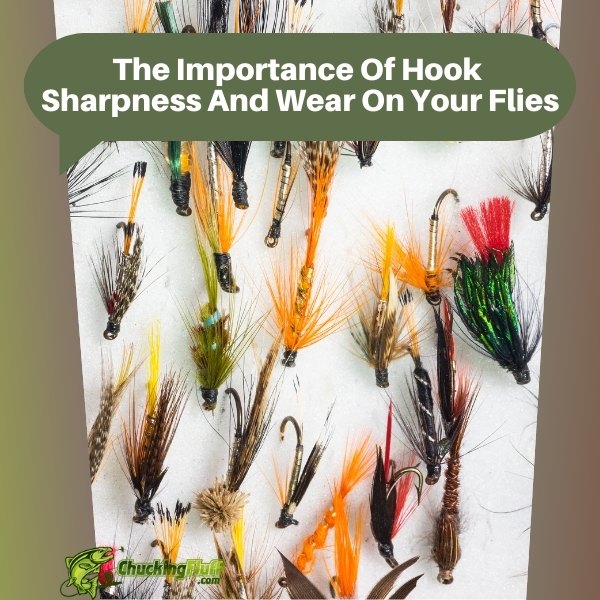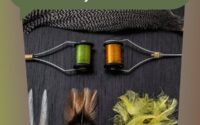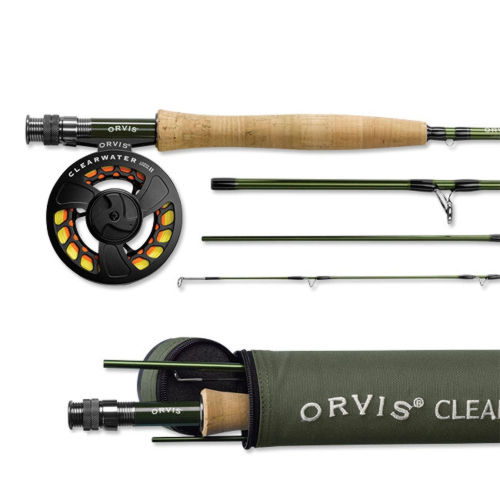| Disclosure: Just to be open and honest the buttons and links you click on in the website will in most cases take you to another website where you can purchase the products I am reviewing. As an Amazon Associate I earn from qualifying purchases. |
The Importance Of Hook Sharpness And Wear On Your Flies

Fishing is as much about skill as it is about having the right gear, and few things are more critical than the sharpness of your hooks. Think of a fishing hook as the handshake between you and the fish—if it’s not strong and sharp, you won’t be landing that catch. This guide dives deep into why maintaining hook sharpness is essential, how to keep your hooks sharp, and how wear and tear can impact your flies.
Quick Post Navigation
- Introduction to Hook Sharpness
- Why Sharp Hooks Matter for Fishing Success
- The Anatomy of a Fishing Hook
- Common Causes of Hook Dullness
- How to Test Your Hook’s Sharpness
- The Impact of a Dull Hook on Your Flies
- Tools for Maintaining Hook Sharpness
- How Often Should You Sharpen Your Hooks?
- Hook Wear and Tear: What to Look For
- The Relationship Between Hook Wear and Fly Performance
- Repairing vs. Replacing Worn-Out Hooks
- Long-Term Care for Fly Hooks
- Environmental Factors Affecting Hook Wear
- Eco-Friendly Disposal of Old Hooks
- Pro Tips for Keeping Hooks Sharp on the Water
- Conclusion
- FAQs
- “Check out some of our other Buying Guides”
Introduction to Hook Sharpness
Imagine casting the perfect fly, the line lands smoothly, and just as a fish bites, you feel it slip away. It’s frustrating, right? More often than not, this isn’t a case of bad luck but rather a dull hook. Hook sharpness is one of the most overlooked aspects of fishing, yet it plays a pivotal role in your success on the water. A sharp hook ensures you get a strong, clean hookset, giving you a higher chance of landing that fish.
Why Sharp Hooks Matter for Fishing Success
Fish have tough mouths, especially larger species. A dull hook will struggle to penetrate quickly and deeply enough to secure a good catch. On the other hand, a sharp hook pierces with minimal effort, ensuring the fish stays on the line. Think of it like using a dull knife versus a sharp one—one requires more force and might not get the job done, while the other slices through effortlessly.
The Anatomy of a Fishing Hook
Before you understand why sharpness matters, let’s break down the basic parts of a hook. Knowing what you’re working with can help you figure out how to maintain and check for wear.
Point
The point is the sharp end of the hook, designed to pierce the fish’s mouth. This is the most critical part when it comes to sharpness.
Barb
The barb is the backward-facing projection that helps hold the fish on the hook once it’s been set. The sharper the point, the easier it is for the barb to do its job.
Shank
The shank is the long straight part of the hook connecting the point to the eye (where the line is tied). While the shank doesn’t need to be sharp, it’s still crucial for the overall strength and integrity of the hook.
Common Causes of Hook Dullness
You might wonder, “How do hooks even get dull in the first place?” A few sneaky culprits cause most of the wear.
Snags and Rocks
Fishing near rocky or snaggy areas can wreak havoc on your hooks. Each time your hook makes contact with a hard surface like a rock, it gets a little duller.
Fish Fights
A strong fight with a fish may seem like a win, but it’s another cause of dullness. The harder the fight, the more your hook is likely to suffer from wear, especially if it’s being tugged against sharp teeth or bones.
Time and Corrosion
Hooks are made of metal, and metal corrodes. If you’re not drying or storing your flies properly, the hooks can rust or wear down over time, which greatly reduces their sharpness.
How to Test Your Hook’s Sharpness
So, how can you tell if your hook is dull? It’s actually pretty simple! Gently run the point of the hook over your fingernail. If it digs in easily and leaves a small mark, your hook is sharp. If it slides or doesn’t catch, it’s time for some maintenance.
The Impact of a Dull Hook on Your Flies
When you’re fishing with a dull hook, you’re essentially giving the fish a free pass. Let’s explore how dull hooks can hurt your fishing game.
Reduced Hooking Efficiency
With a dull hook, you’ll need to exert more force to get the hook to penetrate. This means you might miss out on quick opportunities, especially when fishing in fast-moving waters where every second counts.
Increased Fish Loss
The sad truth is that dull hooks can result in more lost fish. Even if you manage to hook a fish, a dull hook is more likely to slip out during the fight. It’s like using a loose knot on your shoes—it might hold for a while, but eventually, it’ll unravel.
Tools for Maintaining Hook Sharpness
Keeping your hooks sharp doesn’t require anything complicated, but there are a few essential tools you’ll want to have on hand.
Hook Files
A hook file is the most commonly used tool for sharpening hooks. It’s a small, flat file designed to keep the point sharp. Simply slide the hook along the file in one direction, maintaining the natural shape of the hook as you sharpen.
Hook Sharpeners
Some anglers prefer a small, portable hook sharpener, which often looks like a pen or small tool with a grinding surface. These are convenient for sharpening on the go.
When to Replace a Hook Instead of Sharpening
There are times when sharpening won’t save your hook. If the hook is rusty, bent, or has lost its shape, it’s better to replace it altogether. No amount of sharpening will bring back the structural integrity of a damaged hook.
How Often Should You Sharpen Your Hooks?
The frequency of sharpening depends on how often you fish and where you fish. If you’re regularly casting into rocky areas or fighting large fish, you might need to sharpen your hooks after every trip. For most anglers, a quick sharpen after every few outings should do the trick.
Hook Wear and Tear: What to Look For
Regularly inspecting your hooks can save you a lot of heartache on the water. Look for signs of rust, bending, or any loss of sharpness. These are indications that your hook may not be performing as well as it should.
The Relationship Between Hook Wear and Fly Performance
You could have the best-looking fly in your box, but if the hook is dull or worn out, it’s practically useless. A sharp hook is essential for proper fly performance. When the hook is in good condition, the fly will sit right in the water and respond correctly to fish strikes.
Repairing vs. Replacing Worn-Out Hooks
If your hook is slightly dull or has minor wear, sharpening it is the best option. However, if you notice the point is severely bent, broken, or rusted, it’s time to replace it. Fishing with a damaged hook is like riding a bike with a flat tire—it won’t get you far.
Long-Term Care for Fly Hooks
Want to make your hooks last as long as possible? Rinse your flies and hooks with fresh water after every fishing trip, especially if you’ve been fishing in saltwater. Dry them thoroughly and store them in a cool, dry place to prevent rust and corrosion.
Environmental Factors Affecting Hook Wear
Weather and water conditions can significantly impact the lifespan of your hooks. Fishing in salty or brackish water can lead to quicker rusting, while fishing in sandy or muddy environments can dull your hooks faster. Always rinse and dry your hooks thoroughly after fishing in harsh conditions.
Eco-Friendly Disposal of Old Hooks
Fishing hooks are made of metal, and throwing them into the trash can be harmful to the environment and wildlife. Instead, recycle your old hooks where possible, or dispose of them safely by placing them in a container before tossing them.
Pro Tips for Keeping Hooks Sharp on the Water
- Carry a small hook sharpener with you at all times to keep hooks sharp on the go.
- After every fish you catch, check the sharpness of your hook and give it a quick touch-up if needed.
- Avoid letting your hooks hit rocks or other hard surfaces to prevent unnecessary dulling.
Conclusion
Hook sharpness is often the difference between landing the fish of a lifetime and going home empty-handed. By regularly maintaining your hooks and staying vigilant about wear and tear, you can ensure that every cast is as effective as possible. A little sharpening here and there will pay off big time when you’re on the water. So, keep those hooks razor-sharp and ready for action!
FAQs
Can I sharpen any type of hook?
Yes, most hooks can be sharpened, but some hooks, especially those made of stainless steel, can be tougher to work with. Use a proper hook file or sharpener designed for fishing hooks.
How do I prevent my hooks from rusting?
After each fishing trip, rinse your hooks with freshwater and dry them thoroughly. You can also store them with silica gel packets to absorb moisture and reduce the chances of rusting.
What should I do if my hook breaks while fishing?
If your hook breaks while fishing, it’s best to replace it immediately. Broken hooks can’t be salvaged, and continuing to fish with a broken hook won’t be effective.
How can I tell if my hook is too dull?
A quick test is to gently drag the hook across your fingernail. If it scratches the surface or digs in, it’s sharp. If it slides without catching, it’s too dull and needs sharpening.
Should I sharpen hooks on store-bought flies?
Yes! Even new hooks can sometimes benefit from a little extra sharpening. Before your first cast, give the hooks a quick test and sharpen them if needed.


